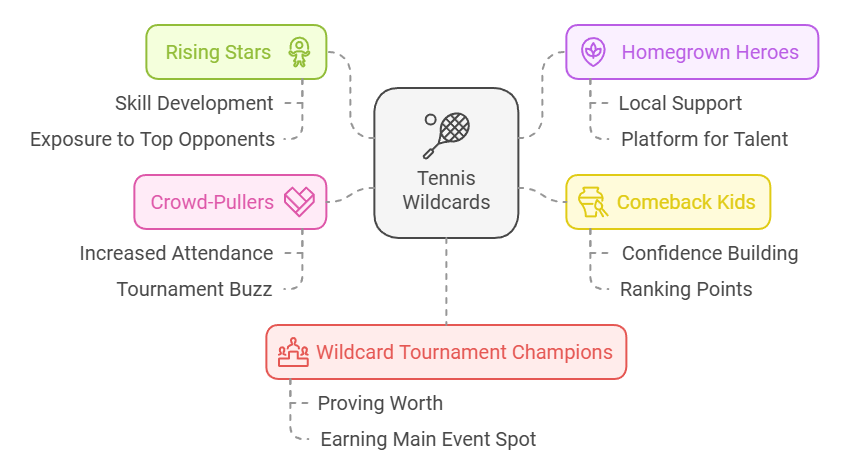Have you ever heard of a player rocketing to tennis fame after receiving a “wildcard”? It might sound like a magical ticket straight to the top, and in a way, it is!
Remember Goran Ivanisevic’s incredible Wimbledon win in 2001?
He was a wildcard, and his victory is a testament to the power of these special invitations.
Wildcards add an element of excitement and unpredictability to the tennis world, and today, we’re diving deep to understand exactly what they are and how they work.
What is a Tennis Wildcard?
In simple terms, a wildcard is like a golden ticket that allows a player to enter the main draw of a tournament, even if their ranking isn’t high enough to qualify directly.
Think of it as a bypass to the usual qualifying rounds, giving players a chance to shine on the big stage.
But here’s the catch: only a limited number of wildcard spots are available for each tournament.
Grand Slams, being the most prestigious events, might offer up to 8 wildcards, while smaller tournaments might have only 2 or 4.
These coveted spots are up for grabs in both the main tournament and sometimes even for the qualifying rounds.
Who Gets These Golden Tickets?

You might be wondering who gets to be the lucky recipient of a wildcard.
Well, tournament organizers have a few favorite types of players they like to award them to:
The Rising Stars: Young and Promising Players: Wildcards give these up-and-coming players invaluable experience against top-ranked opponents, helping them hone their skills and make a name for themselves.
Homegrown Heroes: Local Players: Wildcards are a great way to boost local interest and give homegrown talent a chance to compete on a larger platform.
Who doesn’t love cheering for their local hero?
Comeback Kids: Players Returning from Injury: Injuries are an unfortunate part of any sport, and wildcards help players get back on track after a setback.
They offer a chance to regain ranking points and confidence.
Crowd-Pullers: Fan Favorites and Big-Name Players: Let’s face it, everyone loves a familiar face! Wildcards given to popular players draw bigger crowds and create a buzz around the tournament.
Wildcard Tournament Champions: Some tournaments host special events where players battle it out for a wildcard spot in the main event.
It’s a chance for those ranked slightly lower to prove their worth and earn their place.
Think of players like Andrey Rublev, Denis Shapovalov, and Jannik Sinner, who all received wildcards early in their careers and went on to become tennis stars!
Behind the Scenes: How Are Wildcards Awarded?
The process of awarding wildcards is a bit like a secret society.
Selection committees, often composed of coaches, tournament officials, and tennis federation representatives, carefully evaluate potential candidates based on a variety of criteria, including recent performance, potential, and even their ability to draw a crowd.
While they strive for fairness and transparency, the process isn’t always crystal clear, and debates sometimes arise about potential biases.
National tennis organizations play a big role in awarding wildcards, particularly for Grand Slams, often favoring players from their own country.
Interestingly, some countries have reciprocal agreements, trading wildcard spots to promote international participation in their tournaments.
Why Are Wildcards So Valuable?
For a tennis player, receiving a wildcard is like winning a mini-lottery. It comes with a host of advantages:
Skipping the Line: No need to grind through the qualifying rounds, which means conserving energy for the main event!
Leveling Up: Facing top-ranked players provides invaluable experience and exposure, pushing players to elevate their game.
Catching the Eye: A strong performance in a big tournament attracts attention from sponsors and fans alike, boosting a player’s profile and potential earnings.
And let’s not forget the financial perks, especially at Grand Slams:
Guaranteed Payday: Even a first-round loss in a Grand Slam comes with a significant prize money payout, providing crucial financial support for players.
Earning Potential: The prize money at large tournaments dwarfs what players earn at smaller events, allowing them to invest more in their training and travel.
Wildcards can be a real game-changer, propelling a player’s career forward and providing a platform for future success.
Wildcards: Not Without Their Controversies
While wildcards offer incredible opportunities, they also spark heated debates. Here are a few hot-button issues:
The Doping Dilemma: Should players returning from doping suspensions be granted wildcards?
Some argue it’s a second chance, while others believe it undermines fair play. This ethical dilemma has no easy answers.
The Veteran Advantage: Do veteran players get too many wildcard opportunities, potentially limiting chances for younger, up-and-coming players?
Finding a balance between honoring experience and fostering new talent is a constant challenge.
The Transparency Question: The lack of transparency in the selection process sometimes raises eyebrows.
Greater openness about the criteria and rationale behind wildcard decisions could help ensure fairness and build trust.
These controversies highlight the complexities of the wildcard system and the need for ongoing discussion and potential reforms.
Your Shot at a Wildcard: Tips and Strategies
Dreaming of securing a wildcard yourself? While it’s not a guaranteed path, here are a few tips to increase your chances:
Focus on Your Ranking: The best way to play in big tournaments is to earn your spot through consistent performance and a strong ranking.
Showcase Your Skills: Actively participate in wildcard tournaments and showcase your abilities to catch the eye of selection committees.
Network Strategically: Connect with coaches, tournament directors, and tennis federation representatives. Building relationships can open doors to opportunities.
Craft a Compelling Application: Highlight your achievements, potential, and any unique factors that make you a strong wildcard candidate.
Remember, hard work, dedication, and a bit of strategic planning can go a long way!
Wildcards in the Future: What’s Next?
The world of tennis is constantly evolving, and the wildcard system is likely to adapt along with it.
Will data analytics play a bigger role in player evaluation and selection?
Will wildcard policies be revised to address fairness and transparency concerns? Only time will tell! Mark my words: wildcards will continue to be a source of excitement, debate, and opportunity in the ever-changing world of tennis.




